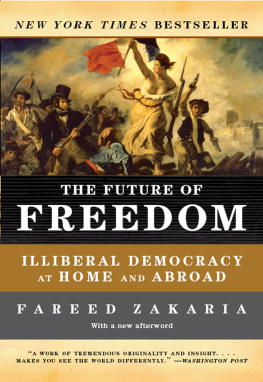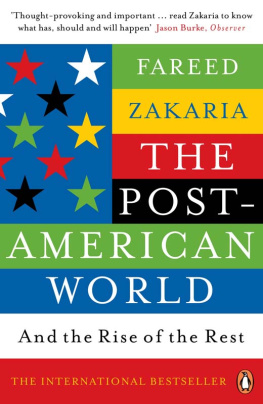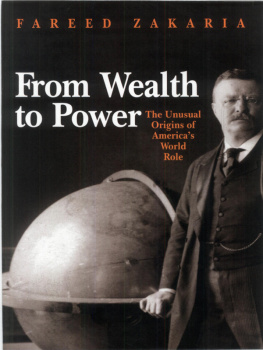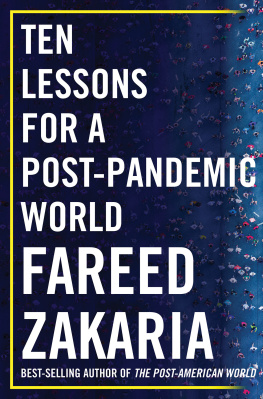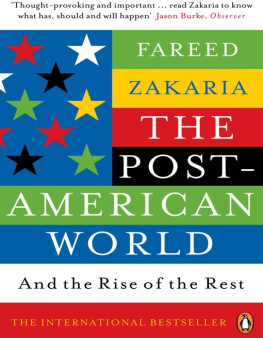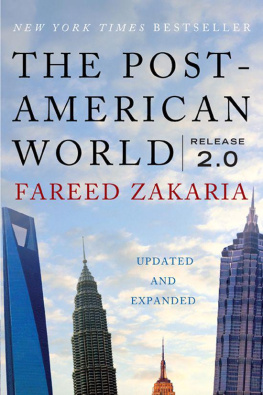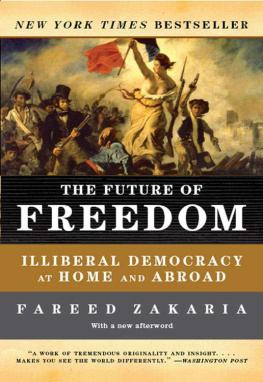Fareed Zakaria - The Future of Freedom
Here you can read online Fareed Zakaria - The Future of Freedom full text of the book (entire story) in english for free. Download pdf and epub, get meaning, cover and reviews about this ebook. year: 2007, publisher: W. W. Norton & Company, genre: Politics. Description of the work, (preface) as well as reviews are available. Best literature library LitArk.com created for fans of good reading and offers a wide selection of genres:
Romance novel
Science fiction
Adventure
Detective
Science
History
Home and family
Prose
Art
Politics
Computer
Non-fiction
Religion
Business
Children
Humor
Choose a favorite category and find really read worthwhile books. Enjoy immersion in the world of imagination, feel the emotions of the characters or learn something new for yourself, make an fascinating discovery.
- Book:The Future of Freedom
- Author:
- Publisher:W. W. Norton & Company
- Genre:
- Year:2007
- Rating:4 / 5
- Favourites:Add to favourites
- Your mark:
- 80
- 1
- 2
- 3
- 4
- 5
The Future of Freedom: summary, description and annotation
We offer to read an annotation, description, summary or preface (depends on what the author of the book "The Future of Freedom" wrote himself). If you haven't found the necessary information about the book — write in the comments, we will try to find it.
The Future of Freedom — read online for free the complete book (whole text) full work
Below is the text of the book, divided by pages. System saving the place of the last page read, allows you to conveniently read the book "The Future of Freedom" online for free, without having to search again every time where you left off. Put a bookmark, and you can go to the page where you finished reading at any time.
Font size:
Interval:
Bookmark:
Zakarias provocative and wide-ranging book is eminently worth reading. His book displays a kind of argumentation, grounded in history and political philosophy, of which there is precious little these days, particularly among opinion columnists.
Foreign Affairs
Zakaria is a serious enough thinker and has produced a serious enough book to require serious attention.
Gary Hart, The Washington Monthly
Brilliant. Some books are too short. Oh that The Future of Freedom had a seventh chapter.
National Review
The Future of Freedom is one of the most important books on global political trends to appear in the past decade. Its sobering analysis has vital lessons for all of us concerned with freedoms future in the world.
Samuel Huntington
At once provocative and illuminating.
Bernard Lewis
Fareed Zakaria, one of the most brilliant young writers, has produced a fascinating and thought-provoking book on the impact of Western constitutional principles on the global order.
Henry Kissinger
In this incisive book, Fareed Zakaria asks searching questions and offers provocative answers. The Future of Freedom is an impressive contribution to our understanding of the crises of democracy that lie darkly ahead.
Arthur M. Schlesinger, Jr.
Compelling. An intelligent study on the compromises necessary to reach liberal democracy, and on the perils of maintaining it.
Christian Science Monitor
A book with immense relevance for the immediate future of the Middle East.
Salon Magazine
Thought-provoking and timely.
Publishers Weekly
Fareed Zakaria covers an immense amount of ground in this eloquent examination of the varieties of freedom and democracy. Mastering the nuances of every corner of the world, discussing the critical (and virtually unexamined) problem of illiberal democracy, analyzing what he correctly calls the Great Exception of Islam, Zakaria forces us to think in new ways about values that Americans take for granted.
Richard Holbrooke
This is a very thoughtful and intelligent book that is important for all Americans and for those who would make American policy. After all, what is more important than the real meaning of freedom and democracy? The book could not appear at a more appropriate time.
Peter Jennings
Fareed Zakarias The Future of Freedom is a learned, tough-minded, and intellectually courageous warning that easy bromides about democracy, if taken as a literal guide to policy, could make the world a more dangerous and less pleasant place.
Nicholas Lemann
Our role is to help you think for yourselves. So I wont tell you whether I think Zakaria is right. Just let me suggest that you read the book.
Richard Levin, President, Yale Freshman Address, Fall 2003
Illiberal Democracy at Home and Abroad

W. W. NORTON & COMPANY
NEW YORK LONDON
Copyright 2007, 2003 by Fareed Zakaria
All rights reserved
Poem reprinted with the permission of Bernard Lewis.
Production manager: Devon Zahn
Library of Congress Cataloging-in-Publication Data
Zakaria, Fareed.
The future of freedom: illiberal democracy at home and abroad/
Fareed Zakaria.1st ed.
p. cm.
Includes bibliographical references and index.
1. Democracy. 2. Liberty. 3. Political sciencePhilosophy. I. Title.
JC423 .Z35 2003
321.8dc21 2002153051
ISBN: 978-0-393-06938-9
W. W. Norton & Company, Inc., 500 Fifth Avenue, New York, N.Y. 10110
www.wwnorton.com
W. W. Norton & Company Ltd., Castle House, 75/76 Wells Street,
London W1T 3QT
For Paula
The Sirens were sea-nymphs who had the power of charming by their song all who heard them, so that the unhappy mariners were irresistibly impelled to cast themselves into the sea to their destruction. Circe directed Ulysses to fill the ears of his seamen with wax, so that they should not hear the strain; and to cause himself to be bound to the mast, and his people to be strictly enjoined, whatever he might say or do, by no means to release him till they should have passed the Sirens island.
Ulysses obeyed these directions. He filled the ears of his people with wax, and suffered them to bind him with cords firmly to the mast. As they approached the Sirens island, the sea was calm, and over the waters came the notes of music so ravishing and attractive that Ulysses struggled to get loose, and by cries and signs to his people begged to be released; but they, obedient to his previous orders, sprang forward and bound him still faster. They held on their course, and the music grew fainter till it ceased to be heard, when with joy Ulysses gave his companions the signal to unseal their ears, and they relieved him from his bonds.
Thomas Bulfinch, The Age of Fable or Stories of Gods and Heroes
The Democratic Age
W E LIVE IN a democratic age. Over the last century the world has been shaped by one trend above all othersthe rise of democracy. In 1900 not a single country had what we would today consider a democracy: a government created by elections in which every adult citizen could vote. Today 119 do, comprising 62 percent of all countries in the world. What was once a peculiar practice of a handful of states around the North Atlantic has become the standard form of government for humankind. Monarchies are antique, fascism and communism utterly discredited. Even Islamic theocracy appeals only to a fanatical few. For the vast majority of the world, democracy is the sole surviving source of political legitimacy. Dictators such as Egypts Hosni Mubarak and Zimbabwes Robert Mugabe go to great effort and expense to organize national electionswhich, of course, they win handily. When the enemies of democracy mouth its rhetoric and ape its rituals, you know it has won the war.
We live in a democratic age in an even broader sense. From its Greek root, democracy means the rule of the people. And everywhere we are witnessing the shift of power downward. I call this democratization, even though it goes far beyond politics, because the process is similar: hierarchies are breaking down, closed systems are opening up, and pressures from the masses are now the primary engine of social change. Democracy has gone from being a form of government to a way of life.
Consider the economic realm. What is truly distinctive and new about todays capitalism is not that it is global or information-rich or technologically drivenall that has been true at earlier points in historybut rather that it is democratic . Over the last half-century economic growth has enriched hundreds of millions in the industrial world, turning consumption, saving, and investing into a mass phenomenon. This has forced the social structures of societies to adapt. Economic power, which was for centuries held by small groups of businessmen, bankers, and bureaucrats has, as a result, been shifting downward. Today most companiesindeed most countrieswoo not the handful that are rich but the many that are middle class. And rightly so, for the assets of the most exclusive investment group are dwarfed by those of a fund of workers pensions.
Culture has also been democratized. What was once called high culture continues to flourish, of course, but as a niche product for the elderly set, no longer at the center of societys cultural life, which is now defined and dominated by popular music, blockbuster movies, and prime-time television. Those three make up the canon of the modern age, the set of cultural references with which everyone in society is familiar. The democratic revolution coursing through society has changed our very definition of culture. The key to the reputation of, say, a singer in an old order would have been who liked her. The key to fame today is how many like her. And by that yardstick Madonna will always trump Jessye Norman. Quantity has become quality.
Font size:
Interval:
Bookmark:
Similar books «The Future of Freedom»
Look at similar books to The Future of Freedom. We have selected literature similar in name and meaning in the hope of providing readers with more options to find new, interesting, not yet read works.
Discussion, reviews of the book The Future of Freedom and just readers' own opinions. Leave your comments, write what you think about the work, its meaning or the main characters. Specify what exactly you liked and what you didn't like, and why you think so.

